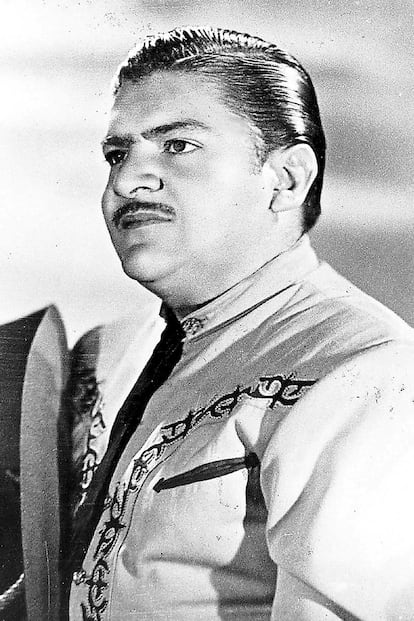José Alfredo Jiménez: A man who meant everything in Mexico
There’s nothing better than José Alfredo’s ‘rancheras’ to understand Mexico and the Mexicans. On the 50th anniversary of his death, a festival in his hometown celebrates his legacy

José Alfredo Jiménez never forgot how shocked he was the first time he saw someone eat cantaloupe with prosciutto. It was at the beginning of his career. “[Writer] Eulalio Ferrer invited me to a fancy restaurant. Among the guests there was a snooty journalist who ordered ‘melon and ham.’ I had never heard that in my life, so when the waiter turned to me, I ordered a jicama [Mexican turnip] with chorizo. You have no idea how the others laughed.” This anecdote came up when his son, José Alfredo Jr, asked him about the food he liked. “Mexican, without a doubt, cantina snacks, mole, tacos sudados, the cured meat from my town and the Veracruz peppers stuffed with cazón that your mom makes. As for vegetables, I don’t even like them in the soup. Not to mention raw fish and steamed Chinese rice; I feel like I’m eating paste.” Some behaviors are a clear window into a person’s nature.
Writer Carlos Monsiváis says that the songs of José Alfredo Jiménez make up a treatise on being Mexican, and ranchera music is a great metaphysical blow. Through a superb use of popular heritage, Jiménez put words to emotion and knew how to convey contradictory and complex feelings with simple lyrics. As his daughter Paloma Jiménez Gálvez, a doctor in Hispanic Literature and a great student of his work, says, “he was a sentimental educator.”
The José Alfredo Jiménez 2023 International Festival, on the occasion of the 50th anniversary of his death, will take place in his hometown: Dolores Hidalgo, Guanajuato, also known as the cradle of the Mexican Independence. From November 23 to 28, exhibitions, concerts, conferences, and documentaries will pay tribute to this icon of national identity who reached such heights that, says writer Juan Villoro, “his last name became unnecessary.” In the prologue to Paloma Jiménez Gálvez’s book Cuando te hablen de amor y de ilusiones, he notes: “In his songs, Mexico saw itself in the mirror. The resentment, the spite, the painful nostalgia, the vindictiveness, the romantic idolatry, the unbridled need to love — the goddamn desire to cry to your heart’s content! — never had a more profound interpreter among us.”
The songs and the life of this “philosopher of the people” hardly differ: “Estoy en el rincón de una cantina / oyendo una canción que yo pedí / me están sirviendo ahorita mi tequila / ya va mi pensamiento rumbo a ti” (I am in the corner of a bar / listening to a song that I requested / As they pour my tequila / my mind begins to wander to you). His songs are a compendium of lost battles, of soliloquies with impatience. “Ando volando bajo / Mi amor está por los suelos / Y tú tan alto, tan alto / mirando mis desconsuelos” (I’m flying low / My love is at rock bottom / And you’re so high, so high / looking down at my sorrows). Like many other people from the countryside, at the age of 11 he was forced to leave Guanajuato and seek a better life in the bustle of Mexico City. He was a waiter and a soccer goalkeeper, but his charro heart would lead him to the mariachis of the Salón Tenampa, a traditional mariachi bar in Plaza Garibaldi.
Not far from the José Alfredo Jiménez House Museum, in Dolores Hidalgo, is the cemetery to which fervent admirers make pilgrimages. The architect Javier Senosiain, known for his organic style of architecture, designed there a mausoleum “in accordance with José Alfredo’s personality,” in which a large copper-colored sombrero hovers over a long sarape made of colorful tiles.
Proof of how José Alfredo used to create his songs (besides whistling) is his response about the creative process of Llegó borracho el borracho (The drunk arrived drunk): “I heard about two compadres who at all costs wanted to pay the other’s bill. They were such friends that they decided to go out into the street and settle the matter with bullets: the survivor would pay the entire bill, 52.35 pesos. But their desire to treat the other was so great that none of them missed. This left two widowed women and an unpaid bill.” José Alfredo is evidence that Mexico is a place of passions, from which, sometimes, there is no turning back.
Sign up for our weekly newsletter to get more English-language news coverage from EL PAÍS USA Edition
Tu suscripción se está usando en otro dispositivo
¿Quieres añadir otro usuario a tu suscripción?
Si continúas leyendo en este dispositivo, no se podrá leer en el otro.
FlechaTu suscripción se está usando en otro dispositivo y solo puedes acceder a EL PAÍS desde un dispositivo a la vez.
Si quieres compartir tu cuenta, cambia tu suscripción a la modalidad Premium, así podrás añadir otro usuario. Cada uno accederá con su propia cuenta de email, lo que os permitirá personalizar vuestra experiencia en EL PAÍS.
¿Tienes una suscripción de empresa? Accede aquí para contratar más cuentas.
En el caso de no saber quién está usando tu cuenta, te recomendamos cambiar tu contraseña aquí.
Si decides continuar compartiendo tu cuenta, este mensaje se mostrará en tu dispositivo y en el de la otra persona que está usando tu cuenta de forma indefinida, afectando a tu experiencia de lectura. Puedes consultar aquí los términos y condiciones de la suscripción digital.









































